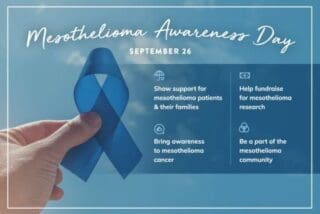
Janet Duprey is a lifelong resident of Peru, NY, a small town in the farthest northern reaches of New York, near the Canadian border and across Lake Champlain from Burlington, Vermont. At the end of 2016, she retired after a 41-year political career.
“I was the youngest person and first woman elected to the Clinton County Legislature in 1975, and I served 10 years before being the first woman elected to a county-wide position,” the former New York Assemblywoman recently told Mesothelioma.com. “I served as the County Treasurer for 21 years from 1986 – 2006 until I resigned upon election to the NY State Assembly, where I served 10 years.”
Duprey got into politics when a former legislator asked her husband to run for office. “He laughed saying ‘Janet’s the politician, ask her,’” she recalled. “The man’s immediate response was there had never been a woman, a woman shouldn’t run because a woman couldn’t do the job. He added: ‘Maybe someday but definitely not now.’”
That response was more than enough to get Duprey’s political wheels spinning. “My Irish genes kicked in, and I was so angry by the time he left our home, nothing could have stopped me from seeking this office to prove a woman could run even if I couldn’t win. Obviously I won,” she added.
Over the next thirty years, Duprey’s positions as a county legislator and treasurer gave her more than enough experience to take the next opportunity when it presented itself. “I decided in 2005 to run for the Assembly, as many of us felt the incumbent Republican Assemblyman was no longer representing us well.”
However, during that period, Duprey and her family were also going through an intense personal struggle. In 1994, Duprey’s father was hospitalized with what the family thought was pneumonia, but it turned out to be something much worse: mesothelioma.
Profile of an Electrician and Family Man
“My Dad was an electrician who first joined the electrical union IBEW when he and my Mom lived in NYC prior to 1945,” Duprey recalled. “When they moved back to the North Country just prior to my birth, he had his own electrical business for several years before going back into IBEW.”
Duprey’s father spent most of the years during her youth and until his retirement in 1975 – the same year she began her political career – working on major construction projects. “He worked on the World Trade Center, the Legislative Office Building in Albany, missile sites throughout the region, prisons, hospitals, schools, and in the later years he and my mom traveled as far away as Louisiana where he found work.”
No matter how far his work took him, however, Duprey remembers her father always returning to his family. “During the years he worked in New York City, Albany, etc., he left home on Sundays and returned late Friday nights so he could spend time with our family. Although he was a tough guy, he dearly loved my mother, brother, and me, and his time away was always difficult.”
“My favorite memories of him are at our camp during the summer,” Duprey continued, “although his time there was also limited, and I have incredibly fond memories of traveling every year back to New York City to celebrate his mother’s birthday on St. Patrick’s Day, as she was born on that day in Ireland.”
After his retirement, Duprey’s father became “Papa” to her son John and daughter Michelle. “He enjoyed the times and opportunities to read books with them, take them places, see their sporting events, all of the many activities he missed as I grew up,” Duprey told Mesothelioma.com. “He was a great dad but he was able to be an incredible Papa!!”
The Dangers of Asbestos Exposure
All of those years traveling back and forth between family and jobs ultimately left its toll on Duprey’s father – not from the travel itself, but because of the dangers that electricians are exposed to every day. One of those dangers is working in buildings full of asbestos, a known carcinogen that is especially dangerous when inhaled, leading to deadly diseases like mesothelioma and asbestosis, which can manifest decades after initial exposure.
“Dad had been tested a few times for about 10 years prior to his diagnosis,” Duprey explained. “He was told X-rays showed a ‘shadow’ that was inconclusive. In 1994, he was hospitalized with what we thought was pneumonia, but X-rays showed full-blown mesothelioma with his lungs filled with tumors. He admitted to having some ‘discomfort’ for quite a while but until he was having extreme difficulty breathing he said nothing. He died three months later in June 1994.”
Duprey’s father was 83 when he was diagnosed. “His immediate reaction was, ‘When you’re 83, something’s going to get you – just never thought it would be this,’” Duprey remembered. “He refused chemo or radiation to alleviate the pain, as there was little or no hope of adding longevity. He was adamant that he wanted to live the projected (and accurate) 3 – 6 months doing what he wanted and not having the effects of treatment.”
“He continued to live his life each day,” Duprey added, “going for coffee with his friends every morning and afternoon and not allowing any sadness until the last few weeks when the pain took over his life.”
At the time of her father’s diagnosis, Duprey’s son and daughter-in-law had a five-year-old daughter, and their son was born on May 12, 1994. “John was thrilled that his Papa Pete, who he was extremely close to, was able to meet his grandson Jeremy although he wasn’t strong enough to hold him.”
Around the same time, Duprey’s daughter Michelle was engaged to her now-husband Robbie. “The two of them spent as much time as possible visiting with Papa so he and Robbie could get to know each other,” Duprey said. “They both had a love for old cars, and my Dad was proud to show Robbie his 1941 Buicks.”
The last excursion Duprey took with her father was the first week in June 1994. “He asked me to take him to camp for the day,” Duprey told Mesothelioma.com. “ It was very emotional for both of us and my husband, but one of my best memories of special time with him.”
“Given the strength and love of my mother, my dad was able to stay home under Hospice Care. His pain the last week was unbearable for all of us to watch this tough guy ravaging with uncontrollable spasms of excruciating pain. Morphine didn’t help but he refused to go to the hospital. He and my Mom would have been married 60 years that November.”
Duprey says her father refused to have any calling hours. “He would be angry that we had a funeral Mass with a full church of mourners,” she said.
Before her father was diagnosed, Duprey was aware of mesothelioma as a possibility, given his close work on construction sites with materials containing asbestos. “He had friends and fellow construction workers who were electricians, plumbers, etc. who were diagnosed and some had died from the disease,” she explained. “However, I had no idea of how quickly it could take over a person’s lungs and body and the horrific pain and suffering he would endure.”
Pushing for Medical Reform
Seeing her father go through the experience of having mesothelioma understandably influenced some of her legislative work as a member of the New York State Assembly. This has shown through in her support of bills such as the Medical Aid in Dying Act.
“Since I was very young, I’ve felt we treat our animals more kindly than our humans as they approach the end of life,” she said. “I’ve held our pet dogs and cats as a veterinarian injected them to end their lives because they were suffering and no treatment was available to help them. I’d dealt with other friends and family members who died painful deaths but I was not with them continuously for the many days – or had the love and connections – as the final days spent with my parents. Watching my father writhe in pain was more than I could bear.”
Seeing the pain and suffering her dad experienced gave Duprey more than enough motive to help others who might be in a similar situation, whether from mesothelioma or some other terminal illness. She went through a similar experience five years later when her mother lost the ability to swallow due to a series of strokes. “She asked me to support her decision to remove her feeding tube, and after consulting with her minister, a priest, and medical doctors who are friends, we understood it would take several days for her to die but it would not be painful.”
Unfortunately, it took 11 days for Duprey’s mother to pass away from starvation. “I don’t believe any person or their loved ones should have to live through that kind of torture,” Duprey insisted, recalling that experience.
“I will do all I can to help the current Assembly members move the Medical Aid in Dying (Death with Dignity) legislation forward,” Duprey stated. “Although I will always wish it had passed before I retired, I hope it passes both houses of the legislature and is signed into law this year. I don’t presume to know if my parents would have asked for medical aid in dying, but I am certain they should have had the ability to choose their own destiny. I want to have the choice of my own destiny.”
Raising Awareness About Mesothelioma
Although retired from her career as a politician, Duprey has kept busy as an advocate for the causes she believes in. “After a radio interview last June [2016], I was surprised at the number of letters and phone calls I received from family members, and a few victims, of mesothelioma. Many of the letters told the same story as that of my dad, and the horrible pain and suffering the patients endured at the end of life. A few that upset me terribly spoke of loved ones taking their own lives, at least two shot themselves. Surely the option of medical aid in dying is more appropriate for both the terminally ill and their families.”
When it comes to asbestos, Duprey believes there is clear reason to stop using it altogether. “It certainly seems to me there is little if any reason to continue to use a building material that we know causes such pain, suffering and death,” she affirmed.
“I’m somewhat embarrassed to admit I haven’t followed any possible federal legislation that might tackle this issue,” Duprey continued, “I believe it would need to be done on a federal level. I do think there is much less use of asbestos on many construction jobs, but that likely isn’t good enough. I’ll pursue this more.”
For those who have been exposed to asbestos, Duprey offers some suggestions. “If anyone suspects he/she has been exposed, they should immediately seek medical attention. There currently are many people living productive lives with early stages of this disease and I expect, like most illnesses, the sooner it’s diagnosed and treated the better the outcome and longevity.”
“My other advice would be to live your life,” Duprey added. “Although my dad didn’t have much time to do so, I admire and respect his decision to enjoy every possible moment with our family and his friends in the time he had left.”




